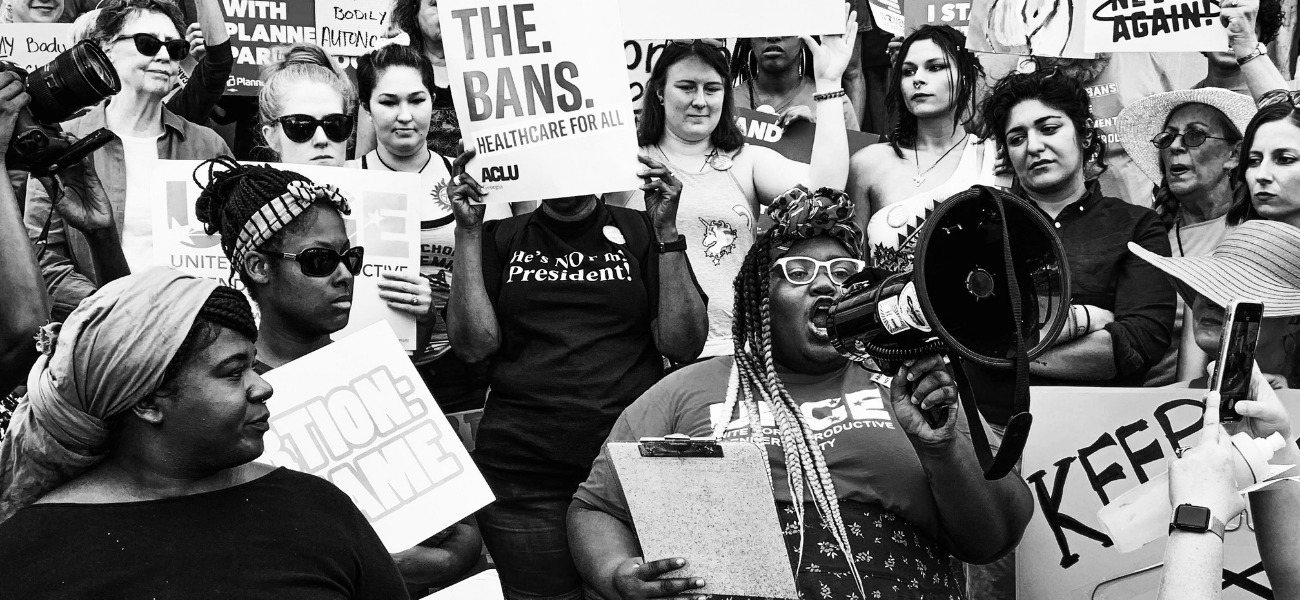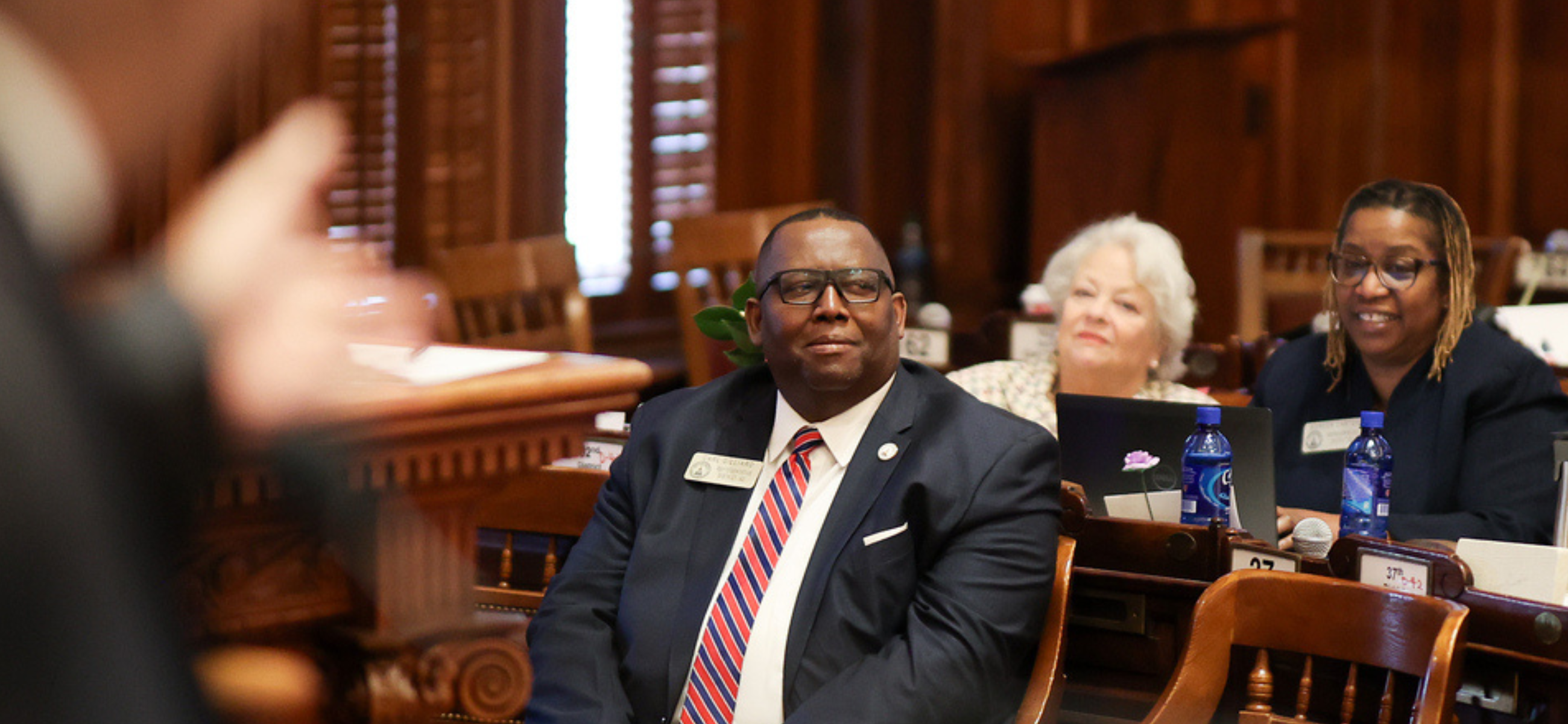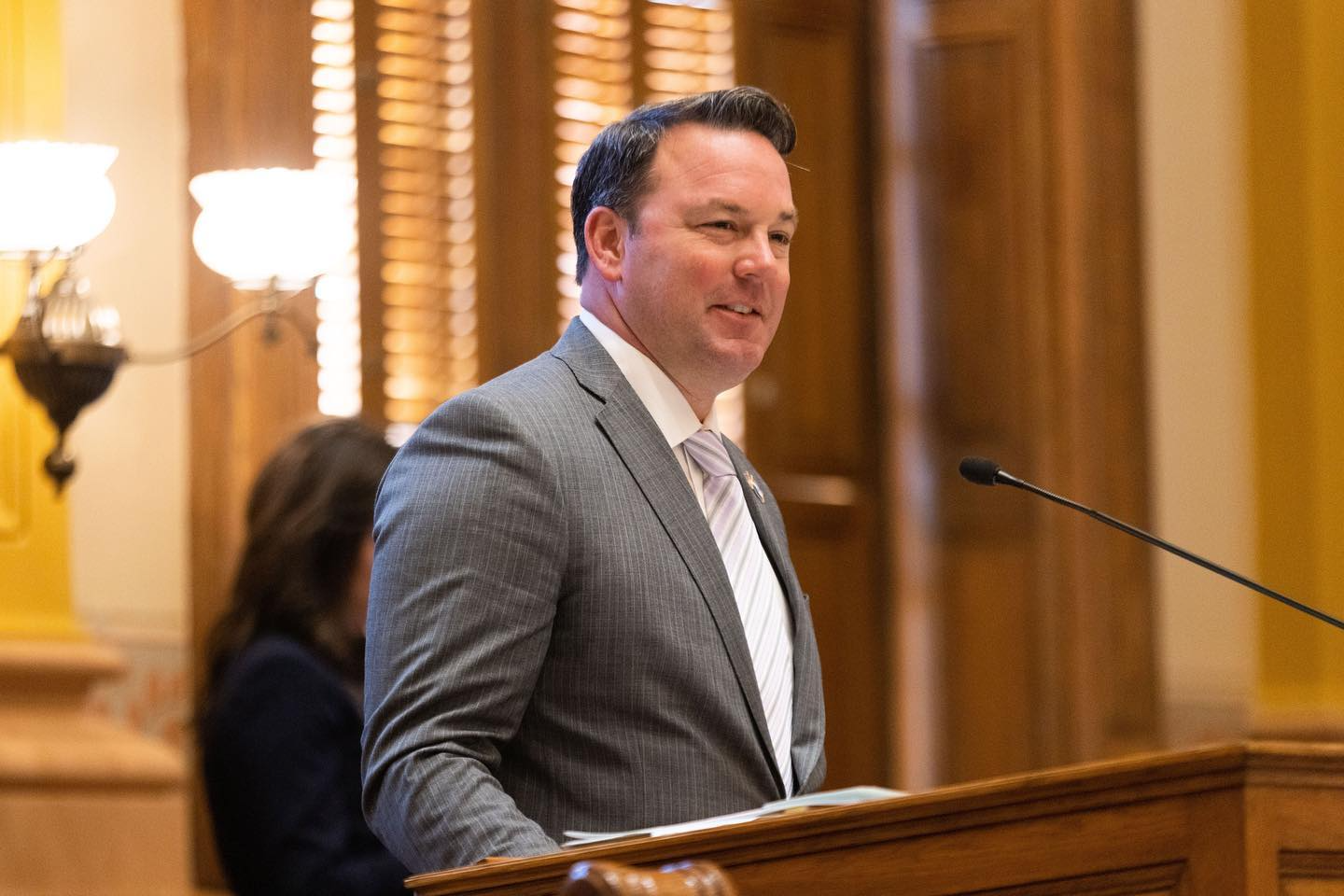Stay ahead of the curve as a political insider with deep policy analysis, daily briefings and policy-shaping tools.
Request a DemoAbortion in Georgia is Still Legal, But What Happens When it’s not?

Photo Credit: Jaira Burke / Em Getsay
- After Roe V. Wade is overturned abortion in Georgia will be largely restricted to six weeks of pregnancy.
- Georgia women wanting an abortion will likely be forced to travel out of state to places like North Carolina or Florida.
- The denial of abortion access is thought to have long-term negative consequences on the lives of women.
ATLANTA, June 3 — Two decades ago the 17-year-old daughter of poor immigrant farm-workers living in rural South Georgia faced a difficult choice: The high school drop-out could carry an unwanted pregnancy conceived from an abusive relationship with a 23-year-old man to term or seek an abortion, and draw the stigma and moral judgment of her Latino and Catholic family.
She made the hard decision. Today Alma, who wished to be identified by her first name for fear of professional repercussions, has a successful career, was the first in her family to graduate from college, and has a loving husband and son. That “American Dream,” she said, would have been impossible without access to abortion.“Everything that I went through, including abortion: Yes, it was my American Dream for sure,” she said.
But with the Supreme Court expected to overturn Roe V. Wade, the landmark 1973 ruling that made abortion access a constitutionally protected right, the laws that permitted Alma to continue her life as a student and pursue a successful career are set to radically change. Legal experts say a Supreme Court reversal of Roe v. Wade could quickly call into effect Georgia’s 2019 ‘Heartbeat Bill’ (HB 481).
And for Georgia women, that could mean having to take to the roadways to find the one or two states in the South where they can legally have an abortion.
The Heartbeat Bill would ban abortion access after six weeks, a point at which women may not even know they are pregnant, let alone have time to plan or consider options. It provides exceptions up to 20 weeks for cases of police-documented rape, incest, or cases of medical necessity such as a threat to the life of the mother or fetal non-viability.
What if HB 481 had been the law when Alma sought an abortion? It is a “what-if” she cannot fathom. “I don't want to think about it. I mean, I honestly don't want to because there was no way that I would be in the place where I am now, or be alive even,” said Alma, now 39.
When Alma sought a second abortion, she and a friend drove the 3-and-a-half hours from her university in South Georgia to Atlanta for the procedure.
In a post-Roe v. Wade Georgia, seeking an abortion could likely take a woman across state lines. Driving to North Carolina or Florida, the nearest likely options, could be a hardship beyond the obvious reason of distance, but those states have mandatory waiting periods, piling on the added expense of lodging.
Even now, with many states across the Southeast having whittled down abortion access over the years by passing increasingly restrictive laws, women from other states are forced into desperate situations.
At the Planned Parenthood Health Center in Tallahassee, women from outside the state show up without any thought of how they will pay for gas to get back home.
“We've had women that will show up to our Tallahassee health center and they don't even have enough money to get back home. They are just so desperate to get the care that they just get in the car and go,” says Christina Noce, communications director for Planned Parenthood for South, East, and North Florida.
Long seen as an “abortion haven” for women in the South, the Sunshine State is seeing an influx of women from Georgia and other surrounding states, says Noce. And if the expected Supreme Court ruling goes into effect, that will only increase.
To handle demand, she said, health centers have expanded hours, particularly in Tallahassee and Jacksonville which are close to the Georgia border, and medical staff is being also moved around within the state to address surges.
Currently, abortion is legal in the Peach State up to the 22nd week of pregnancy. But, abortion advocates are preparing for heavily restricted or outright abortion bans across the Southeastern United States, except in North Carolina and Florida.
Georgia women who can afford to make arrangements to travel will still face mandatory wait times of 24-hours in Florida and 72-hours in North Carolina, meaning accommodation like a hotel is an added burden.

Illustration by Brittney Phan for State Affairs.
“If Roe V. Wade is overturned, we are in a situation where we could see 36 million women, and others who can get pregnant across the country, be in a situation where they're now in an abortion desert, and this will be mostly across the South and the Midwest,” said Lauren Frazier, director of communications for Planned Parenthood in the Southeast.
Some three-quarters of women seeking abortion in Georgia are women of color, according to state statistics. Abortion rights advocates say these women are often the most likely to face financial barriers to reproductive healthcare.
Two decades ago, Tamika English, then 16, and a Black resident of Atlanta, might have been forced to travel out of state. “I was able to graduate high school, go on to college, and have a very successful career, which all would have been completely impossible had I not had access to make a decision about whether or not I wanted to carry a child at that time,” English said.
Now a 40-year-old real estate and insurance agent and program manager for a nonprofit organization with a 14-year-old daughter, English said she’s thankful that abortion access was legal, safe, and not threatened at the time. Now, she said, she’s concerned about her daughter if she were facing a similar situation.
“I was not in a position to take care of a child. I didn't have a support system that would make that possible,” she said. “And so for the sake of a child not having to have a child, we sought out abortion care.”
And even though English says she caught her pregnancy early, she doubts she may have been exactly within the six-week window that would be allowed under the new law.
“I could have very well missed their six-week window,” she said. “By the time you figure out you're pregnant, there was this window of time that I needed to process the emotions, all the emotions just from knowing ... and then there were the days that I needed to mull over in my mind what I wanted to do, what options I had, what choices I had, what I wanted for my future.”
25-year-old Reyna, whose name State Affairs changed to protect her identity, was 21 when she had an unplanned pregnancy with her then-boyfriend. A university student in Macon at the time, she caught her pregnancy almost as early as is theoretically possible, at four weeks and three days.
Even so, the earliest she could book an appointment at the nearest clinic in Atlanta was two weeks away, and in the meantime, she had to pull together money, and transportation and plan the day off work and classes. Earning nearly $100 a week at her student job, the prospect of traveling to North Carolina and Florida, which would have added the expense of a hotel, would have complicated things.
“It probably wouldn't have been likely (for me to travel),” she said.
And like Alma and English, Reyna too says “if I had not had my abortion, I would not be where I am right now.”
And while she said that she knows plenty of young parents in college can succeed, she also knows herself. “I know I would not have succeeded. And people could say I'm limiting myself but I am being realistic.”
Traveling for abortion services isn’t entirely new, says Emory political science professor Andra Gillespie.
“We see some of this already: Abortion access is unequal across the United States, it's unequal within states depending on where you live, urban versus rural,” says Gillespie, adding that “people already traveled long distances … (but) it might mean that some people will have to travel farther than they already do.”
Data published by the Guttmacher Institute shows that for Georgia women, the average one-way driving distance to abortion services will jump from 17 miles to nearly 200 miles under a ban, and it’s a pattern that repeats across the Southeast.
In North Carolina, Dr. Katherine Farris, chief medical officer for Planned Parenthood South Atlantic and a fellow at Physicians for Reproductive Health, said network providers and independent providers are banding together to manage resources and not be caught flat-footed with an influx of women from other states. When Texas passed a restrictive abortion law last September that, to the surprise of many, was not enjoined by the courts, Farris said providers in nearby states were overwhelmed.
“There have been a lot of lessons learned from the Texas ban … There was not a lot of time for surrounding states to prepare. And they saw an overwhelming number of patients coming from Texas and [that] impacted local patients looking for an abortion who had to either delay or move further out so that they could access abortion sooner,” said Farris.
To ensure access, she said, providers are collaborating and putting in place “patient navigators,” specifically trained staff that will help overcome financial, bureaucratic, and logistical barriers that patients might face.
The consequences for those who can’t afford to travel out of Georgia, advocates say, are dire for the most vulnerable populations: Increased maternal mortality, socio-economic hardship and mental anguish. “Especially given that Georgia has not expanded Medicaid, that we have incredible provider deserts and specifically the number of counties that do not have an obstetrician is astounding here,” said Sara K. Redd, a postdoctoral fellow at the Center for Reproductive Health in the Southeast at Emory University’s Rollins School of Public Health.
Indeed, 78 of Georgia’s 159 counties have no OB-GYN.
Redd also points to the Turnaway Study, produced by the University of California San Francisco, which found that compared to women who were able to access an abortion, women denied abortion access had long-lasting socioeconomic hardships including lower credit scores, higher risk of domestic violence, higher rates of food insecurity, higher likelihood of living below the federal poverty line and a higher likelihood of raising children alone.

A view of the Bans Off Our Bodies demonstration in front of the Georgia Capitol on May 14, 2022. Photo courtesy of John E. Ramspott.
Still, anti-abortion rights activists see an opportunity to fill the gap in maternal care services to address those issues. They argue that communities, churches, and the state can rise to the occasion and provide resources for women who decide to go through with the pregnancy.
“I think it's an opportunity for the church to be able to do what it says it's always believed. … To show mothers and children that we really do care, we're going to be there for you,” said Mike Griffin, a lobbyist for the Georgia Baptist Mission Board.
“We want to make sure that we've got these things in place so that women — when they're put in a decision-making process — they can say, ‘You know, it's very favorable in the state of Georgia to choose life rather than to take an abortion pill, (or rather) than to go to another state,’ ” said Griffin.
Anti-abortion rights advocates point to laws like Betsy’s Law. The bill, signed by Gov. Kemp this year, provides state licensing for maternity supportive housing that enables non-profits such as churches to provide housing and assistance for mothers and minor children during pregnancy and up to 18 months after childbirth. According to the Georgia Life Alliance (GLA) there are over a dozen such facilities preparing to become operational.
"I know many on our side leave a bad taste, and sometimes for very good reasons; but there are those ... who truly put their actions where others have only words. GLA and those we work with are committed to filling in the support gaps that will be made even wider with our Heartbeat Bill in effect," said Elizabeth Reed, Leadership Director for GLA.
Life-long anti-abortion rights activist Virginia Galloway said it’s time for those who have been loud anti-abortion rights voices to put their money where their mouth is and “step up to the plate” and ensure resources are available to women by donating to charities.
In the meantime, abortion advocates in Georgia want to emphasize that, until it isn’t, abortion is still legal in the Peach State.
“The most important message that we want to get out to people is that: Right now, abortion is still safe, legal, and available. So if they need to come into our Planned Parenthood health centers for care, we can certainly support them with getting those vital reproductive health care services at our clinics,” said Planned Parenthood’s Frazier.
Join The Conversation:
Abortion funds, advocacy, and services
- Amplify Georgia Collaborative
- Planned Parenthood Southeast
- Feminist Women's Health Center
Anti-abortion rights organizations
- Georgia Baptist Mission Board
Information on Maternity Homes in Georgia, Department of Human Services: https://dhs.georgia.gov/maternity-homes
What do you want to know about the future of abortion access in Georgia? Share your thoughts: [email protected], Twitter: @alemzs
Read this story for free.
Create AccountRead this story for free
By submitting your information, you agree to the Terms of Service and acknowledge our Privacy Policy.
Barbershop talks and hip-hop summits: Georgia Black legislators’ group has big plans to build coalitions, boost voter rolls
The nation’s largest gathering of Black lawmakers is slated to meet in Atlanta this summer to discuss ways to boost voter participation nationwide ahead of the upcoming fall elections.
The Aug. 2-4 conference theme is “Testing 1, 2, 3.” The meeting will be the precursor to a series of events the Georgia Legislative Black Caucus plans to hold heading into the November presidential election.
“Because we’re the largest Black caucus in the nation, we’re reaching out to all of the caucuses from across the nation,” Rep. Carl Gilliard, D-Savannah, chairman of the 74-member Georgia caucus, told State Affairs. “This is the first time that I think we’re doing a total reach-out to all of the Black caucuses. We share a lot of similarities. Whether it’s voter suppression in Georgia, the same laws are going to be tried in Tennessee and the same laws are going to be tried in Florida. We share a lot of commonalities.”
Next week, for instance, the Georgia caucus is scheduled to issue a statement supporting efforts to pass a hate crimes bill in South Carolina. The bill passed in the House but stalled in the Senate, Gilliard noted.
Over 700 Black legislators represent about 60 million Americans, according to the National Black Caucus of State Legislators. In addition to the Georgia caucus, Black caucuses exist in nearly three dozen states.
Shortly after the August convention, the Georgia Legislative Black Caucus will embark on a 14-city tour throughout Georgia to focus on “getting out the vote.”
“We’re not going to tell them who to vote for,” Gilliard said of voters. “But what is happening right now is no one is talking to the people. And if the election were held today, we all would be in trouble because no one is talking or meeting the people where they’re at.”
The tour is a continuation of various actions the Georgia Legislative Black Caucus has taken this year to align with other organizations of people of color on common causes.
In March, the caucus joined forces with the Asian American Pacific Islander and Hispanic caucuses for a tri-caucus town hall. It was the first time the three groups have aligned. The Black caucus also has “reached out to partner with the Hindus of North America population and the diaspora,” Gilliard said.
“What we’re trying to do is form a coalition to get to as many diverse groups of people as we can,” he said.
Gilliard said the lack of individual and collective involvement in communities he’s seeing concerns him. It’s a far cry from four years ago.
In 2020, the deaths of Ahmaud Arbery, an unarmed Black man murdered while jogging in Glynn County, and Breonna Taylor, a Black woman killed by Louisville, Kentucky police serving a no-knock warrant for drug suspicion, led to more than 450 protests nationwide and on three continents.
That same year, former Georgia gubernatorial candidate Stacey Abrams led an effort to increase the voter rolls for the 2020 presidential election. Fair Fight and the New Georgia Projects, two groups Abrams founded, registered more than 800,000 new voters.
That level of community and political engagement has since subsided, Gilliard said.
“People don’t know what’s going on,” Gilliard said. “No one is really talking to the people. You’ve got a presidential election. I’m talking about on both [political] sides. There are rallies and different events being held, but nobody has gone to the barbershop. No one has gone to the community centers or the neighborhoods. We’re going to be empowering those communities by going and taking those townhall meetings right where they’re at, not in a big municipality but in community centers and neighborhoods.”
The caucus also plans to hold a hip-hop summit to reach young people, many of whom are skeptical of both political parties.
“They’re forming their own opinions,” Gilliard said. “They’re saying, ‘Forget about Trump. We need to hear something different.’ That’s just their perception. That’s why I’m really quietly championing the young candidates behind the scenes who are running right now because we need young leaders.
“We have to get as many people together, but we also have to get them ready to work.”
Have questions, comments or tips? Contact Tammy Joyner on X @lvjoyner or at [email protected].
And subscribe to State Affairs so you do not miss any news you need to know.
X @StateAffairsGA
Instagram@StateAffairsGA
Facebook @StateAffairsGA
LinkedIn @StateAffairs
Special prosecutor to decide if Lt. Gov. Jones should face criminal charges in 2020 election-meddling case
Lt. Gov. Burt Jones will face scrutiny over whether he should be criminally charged for alleged meddling in the 2020 presidential election in Georgia. The Prosecuting Attorneys’ Council of Georgia said Thursday it has assigned Executive Director Pete Skandalakis as the special prosecutor to handle the case because Fulton County District Attorney Fani Willis is …
Georgia taxpayers get a tax credit for helping young adults leaving foster care
The Gist Georgia lawmakers in 2022 laid the groundwork to help young adults leaving the foster care system get a good start in life while giving taxpayers another tax relief option. At that time, the Georgia General Assembly passed House Bill 424, also known as the Fostering Success Act. This law created the Qualified Foster …
Special election runoff for House seat in Columbus may be dress rehearsal for general election
ATLANTA — Two Georgia Republicans who virtually tied in a special election held Tuesday to fill the Columbus-area seat of the late state Rep. Richard Smith, will now compete in a May 7 runoff. Sean Knox, who heads a pest control company, won only 12 more votes than Carmen Rice, a corporate administrator who’s the …




